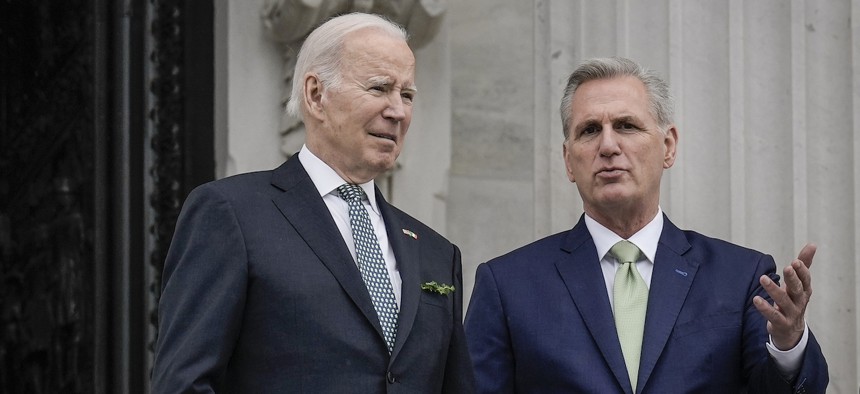
President Joe Biden and Speaker of the House Kevin McCarthy, R-Calif., talk as they depart the U.S. Capitol following the Friends of Ireland Luncheon on Saint Patrick's Day in March 2023. Debt limit negotiators were beginning to show signs of optimism earlier in the week, but on Friday paused the discussion due to a lack of progress. Drew Angerer/Getty Images
Talks on a Spending and Debt Deal Come to a Halt
As negotiators look to avoid delaying paychecks for feds, Republicans say they hit pause on negotiations.
Negotiations between the White House and congressional Republicans to raise the nation's debt limit and avoid a government default have hit a setback, according to officials on both sides of the talks, as the key players have opted to pause the discussions Friday due to a lack of progress.
Earlier in the week, negotiators were beginning to show signs of optimism, acknowledging they remained apart but had created a path toward an eventual deal. That came to a screeching halt Friday when discussions abruptly ended with no immediate plans to resume them.
“Until people are willing to have reasonable conversations about how you can actually move forward and do the right thing, then we’re not gonna sit here and talk to ourselves,” Rep. Garret Graves, R-La., who House Speaker Kevin McCarthy, R-Calif., tapped to lead the talks with White House staff, told reporters on Capitol Hill. Graves said the White House was being “unreasonable" and suggested it was Republicans’ decision to walk out: “We decided to press pause because it’s just not productive.”
Republicans have made significant demands on federal agency spending caps and other means to reduce annual deficits, ignoring President Biden’s plea to pass a “clean” debt ceiling hike that would enable the government to pay its bills past a deadline that could come as soon as early June. After months of standstill, the White House and McCarthy agreed to engage in discussions over a potential spending deal that would accompany an increase to the borrowing limit.
The framework of a potential deal was expected to include at least discretionary spending caps for fiscal 2024 and beyond, though the exact length of those restrictions was still to be hashed out. Both sides had signaled a willingness to claw back unspent COVID-19 pandemic aid and institute some new restrictions on qualifications for certain federal programs that assist low-income individuals and families, though the exact parameters of those changes have remained an enduring sticking point.
A White House official acknowledged the challenge facing negotiators, but suggested a deal was still possible.
“There are real differences between the parties on budget issues and talks will be difficult,” the official said. “The president’s team is working hard towards a reasonable bipartisan solution that can pass the House and the Senate.”
Earlier Friday, the White House struck a more optimistic tone, saying Biden was “confident that Congress will take necessary action to avoid default.”
“The president’s team informed him that steady progress is being made,” the White House said. “The president directed his team to continue pressing forward for a bipartisan agreement and made clear the need to protect essential programs for hardworking Americans and the economic progress of the past two years as negotiations head into advanced stages.”
McCarthy, after meeting with Biden and other congressional leaders at the White House earlier this week, said the two sides remained “a long way apart” but praised the president for designating Office of Management and Budget Director Shalanda Young and Counselor to the President Steve Ricchetti to lead the talks going forward. The speaker said negotiators needed to reach an agreement by the end of the week to pass a bill by June 1.
Treasury Department Secretary Janet Yellen said earlier this month the government could default on its debts as soon as June 1, though cautioned the actual deadline could be “a number of weeks later.” The Bipartisan Policy Center, a think tank that focuses on budget and debt ceiling issues, has estimated that the “X date” on which the government will no longer have enough cash to meet its obligations will fall between early June and early August.
There are not currently any specific plans to resume the negotiations, officials said.
Senate Minority Leader Mitch McConnell, R-Ky., as he has for the last several weeks, said the onus was on Biden and McCarthy to strike a deal.
“They are the only two who can reach an agreement,” McConnell said. “It is past time for the White House to get serious. Time is of the essence.”
While economists and lawmakers have speculated about a range of outcomes if an unprecedented default were to occur, most have agreed the most likely scenario would require the Treasury to delay all government payments until it had enough money available to meet the demands of a given day. That would likely require federal employees to either face furloughs or work with only the promise of back pay once the situation was resolved. Agency payments to beneficiaries, states, grantees, contractors and, potentially, their own employees, would be disrupted. Treasury could pick and choose which payments to make each day, though officials have said that would present legal and operational challenges.







